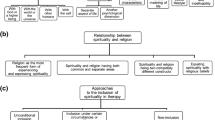Abstract
This article presents a limited number of findings from a larger research project that explores spiritual themes related to the experience of homelessness as reported by 16 research participants following their residence in a 90-day emergency shelter program in Los Angeles County, California. By utilizing interpretive phenomenological analysis, the study focuses solely on three spiritual themes present in the experience of homelessness. Participants noted experiencing the presence of hope and motivation while homeless, the challenges of coping with the homeless stigma, and times in which they felt (and did not feel) “human.” Implications for pastoral counselors and others offering spiritually-integrated counsel in the context of homelessness are discussed.
Similar content being viewed by others
Notes
A biblical foundation for serving the homeless is found in scriptural passages such as Leviticus 25:35–36, Isaiah 58:6–8, and Matthew 25:34–40. Based on this biblical imperative, some of the many church- and faith-based organizations offering pastoral care and counseling to the homeless in the United States, United Kingdom, and Canada include: Interfaith Action of Evanston; UNLEASH: Church Action on Homelessness; Churches Action for the Homeless (CATH); Public Action to Deliver Shelter, Inc. (PADS, Inc.); Room in the Inn; and Out of the Cold. Information on each of these organizations is available online.
References
Baker-Fletcher, G. (1993). Somebodyness: Martin Luther King, Jr. and the theory of dignity. Minneapolis: Fortress Press.
Belcher, J. R. (2003). Helping the homeless: what about the spirit of God? Pastoral Psychology, 51(3), 179–188. doi:10.1023/A:1021323123034.
Brown, B. (2010, June). Brené Brown: The power of vulnerability [video file]. http://www.ted.com/talks/brene_brown_on_vulnerability.html. Accessed 9 July 2013.
Cogan, K. (2004). Unexpected blessings: Sunday morning in a homeless shelter. Journal of Pastoral Care and Counseling, 58(4), 373–374. http://www.jpcp.org/.
Corbin, J., & Strauss, A. (2008). Basics of qualitative research: Techniques and procedures for developing grounded theory (3rd ed.). Thousand Oaks: Sage Publications.
Douglas, A. N., Jimenez, S., Lin, H. J., & Frisman, L. K. (2008). Ethnic differences in the effects of spiritual well-being on long-term psychological and behavioral outcomes within a sample of homeless women. Cultural Diversity and Ethnic Minority Psychology, 14(4), 344–352. doi:10.1037/1099-9809.14.4.344.
Greene, J. A., Ball, K., Belcher, J. R., & McAlpine, C. (2003). Substance abuse, homelessness, developmental decision-making and spirituality: a women’s health issue. Journal of Social Work Practice in the Addictions, 3(1), 39–56. doi:10.1300/J160v3n01_04.
Hurlbut, J. M., Robbins, L. K., & Hoke, M. M. (2011). Correlations between spirituality and health-promoting behaviors among sheltered homeless women. Journal of Community Health Nursing, 28, 81–91. doi:10.1080/07370016.2011.564064.
Lartey, E. Y. (2003). In living color: An intercultural approach to pastoral care and counseling (2nd ed.). London: Jessica Kingsley Publishers.
Mied, J. (2002). Pastoral counseling of the homeless. Pure Land, 18–19, 223–268.
Milburn, N. G., & D’Ercole, A. (1991). Homeless women: moving toward a comprehensive model. American Psychologist, 46, 1161–1169. doi:10.1037/0003-066X.46.11.1161.
Moustakas, C. (1994). Phenomenological research methods. Thousand Oaks: Sage Publications.
Ponterotto, J. G. (2005). Qualitative research in counseling psychology: a primer on research paradigms and philosophy of science. Journal of Counseling Psychology, 52(2), 126–136. doi:10.1037/0022-0167.52.2.126.
Shallcross, L. (2010). Putting a human face on homelessness. Counseling Today. http://ct.counseling.org/2010/01/. Accessed 9 July 2013.
Shuler, P. A., Gelberg, L., Brown, M. (1994). The effects of spiritual/religious practices on psychological well-being among inner city homeless women. Nurse Practitioner Forum, 5(2), 106–113. http://www.ncbi.nlm.nih.gov/pubmed/8012240. Accessed 9 July 2013.
Smith, J. A., Flowers, P., & Larkin, M. (2009). Interpretive phenomenological analysis: Theory, method, and research. Thousand Oaks: Sage Publications Inc.
Thornton, S. G. (2010). Homeless in Seattle: A lived religion of hospitality. In J. F. Maynard, L. Hummel, & M. C. Moschella (Eds.), Pastoral bearings: Lived religion and pastoral theology (pp. 91–118). Lanham: Lexington Books.
Washington, O. G., Moxley, D. P., Garriott, L., & Weinberger, J. P. (2009). Five dimensions of faith and spiritually of older African American women transitioning out of homeless. Journal of Religion and Health 48(4), 431–444. doi:10.1007/s10943-008-9198-6
Wimberly, A. S. (1988). Spiritual care for the homeless. Explor: A Journal of Theology, 9, 83–107.
Author information
Authors and Affiliations
Corresponding author
Rights and permissions
About this article
Cite this article
Snodgrass, J.L. Spirituality and Homelessness: Implications for Pastoral Counseling. Pastoral Psychol 63, 307–317 (2014). https://doi.org/10.1007/s11089-013-0550-8
Published:
Issue Date:
DOI: https://doi.org/10.1007/s11089-013-0550-8




